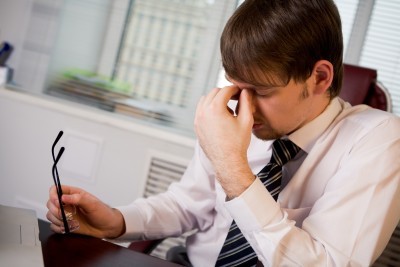Sleepiness versus Alertness
The Eternal Struggle
Stop and think for a minute how it feels when you get sleepy in the middle of the day.
It’s a feeling we all get from time to time and it has away of coming on when you least expect it. A dull heaviness seems to permeate your entire being right through to your bones. And as you move around, you sort of have to drag yourself bodily from place to place. It’s like all the strength has gone out of your muscles; all the iron has gone out of your blood. Your arms and legs feel like just so much deadweight and you wonder if the earth’s gravitational pull suddenly got stronger somehow.

Eyelids are at half-mast. You keep having to force them back open all the way. You sit for a minute, staring zombie-like into the middle distance trying to refocus. Your eyes feel sticky and sore. The flesh and bone around your eye-sockets feel raw and tender. It seems like an intolerable burden just to hold up your head. Then the yawns start coming. At first you try to be inconspicuous about it, concealing the yawn behind a polite hand. But they’re like hiccups; they keep coming one right after another.
You glance over at the clock. Could that be right? It almost seems like the passage of time itself has slowed down in sympathy with your own sluggishness. And yet the pace of activity around you seems impossibly frenetic. You feel vacant. Floaty and detached. Easily distracted. Your ability to think through and solve problems has mysteriously vanished. Tasks that are normally a piece of cake seem insurmountable.
Running on Empty
This isn’t gonna cut it! You try to snap yourself back into alertness. You fidget and shift around in your chair. Shake your head back and forth to try to stir the brain a little. Rub your eyes and slide your hands down your face. You lean back and reach your arms out in a mighty stretch.
This helps some, but the feeling of sleepiness won’t be shaken off that easy. You feel like a swimmer who’s gradually being pulled out to sea by the tide, and no matter how much you struggle to swim back to shore, you keep drifting out.
You can’t stop thinking about sleep. How wonderful it would be to just give yourself over to it right now with complete abandon. It’s an obsession that colors your every thought and perception. The laptop on your desk starts to look like it would make a really nice pillow. That hard floor over there looks like the world’s most comfortable bed.
At its most extreme, sleepiness turns into full-fledged drowsiness. You can no longer even keep your eyes open; your head bobs around like a two-day-old helium balloon. You’re not in control anymore — teetering right on the edge of sleep, and likely to nod off in an instant. You do not want to be doing anything important, like driving a car or operating heavy machinery when you get to this point. Drowsiness is a warning sign that you need to take yourself out of the game right away.
But when sleepiness comes at the right time – in the evening, when it’s time for bed and you can give yourself in to its charms – it is pure, absolute heaven. Just close your eyes, let yourself go, and drift off blissfully into an immaculate snooze.
Alert!
Now turn the question around and think about how it feels to be super alert in the daytime.
This can be a real feeling of exhilaration, to be truly awake and on — when every fiber of your body seems to be infused with vitality and you have limitless strength and endurance. All your muscles are limber and energized, working in perfect concert with your mind. You feel like the lungs in your chest are filled with pure oxygen. You move around effortlessly with a rapid, sure-footed step. You could jump over any hurdle that came into your path. You are impervious to aches and pains. Every system in your body seems to be functioning at peak performance. You feel ready for anything.
You are firmly engaged with your environment. Your senses are keen and your perceptions vividly clear. It’s almost as if you could see out the back of your head and around blind corners. And yet you have the ability to filter out noise and unwanted distractions to focus on what’s important. You pick up on little details that you might otherwise miss.
You get along better with the people around you. Your communication skills are enhanced. You are quicker to comprehend what others are saying. And you find it easier to exchange ideas and express yourself persuasively.

You go through your work like a hot knife through butter. Everything you do seems to fall right into place. You are a multi-tasking machine. You almost relish every mental and physical challenge that comes your way. You have laser-beam-like concentration. Your mind is dynamic, fluid, and agile — able to instantly adapt to any surprises that may come along. You anticipate things before they happen, always thinking two or three moves ahead.
The left and right sides of your brain are working well together: your ability to reason through problems is extremely sharp, but your intuition and creative powers are also very strong. You seem to be able to come up with novel solutions to problems as if pulling them out of a hat.
You are motivated in everything you do — even as you do tasks that you often find disagreeable. You are optimistic about getting things done. You can see things slowly coming together. You feel like you have a great deal of momentum going, almost like you’re having a run of great good luck. You have a high level of determination and confidence which allows you to feel laid back and easy-going. You do your work in a spirit of playfulness and fun.
Time moves by rapidly and you can’t hardly believe it when the day is over. You find it hard to break off from what you are doing. You feel like you could go on like this indefinitely.
Where’s the On/Off Switch?
Most of the time, of course, we find ourselves falling somewhere in between these two extremes of absolute alertness and terminal sleepiness — imagine yourself on a sort of sleepiness/alertness continuum. Sleep researchers have been working for decades to understand the exact biological mechanisms and external dynamics that drive all this.
We might tend to think of this issue as just a simple matter of accounting: how much sleep did you get last night balanced against how long you’ve been going today. And it’s true that this has a lot to do with how tired you will feel. But this is really only one part of the equation.
Think back to all the times in the past when you’ve been just plain dead tired, like if you didn’t get some sleep soon, you would fall over on your face. But then an hour or two later, something kicks in — you get that “second wind” and suddenly you’re back on track and ready to go for hours more. What exactly is behind all this?
There’s more to this question than just mere scientific curiosity. At any given time, there is a definite link between how tired you are and how well you will function mentally and physically. Says pioneering sleep researcher William C. Dement:
I now think of the continuum of sleepiness and alertness as the state upon which all human behavior is acted out. Today we can claim with confidence that where we are on this continuum, from the high peak of optimal alertness to the deep trough of extreme drowsiness, is the single most important determinant of how well we perform.
In other words, if you want to get the most out of life — if you seek happiness, health, and success in abundance — you really owe it to yourself to understand this issue.
The Importance of Being Sleepy
Those of us who tend toward the Type-A personality will be tempted to think of alertness as an absolute good and sleepiness as some kind of ailment to be cured of. But it’s important to remember that they both serve a vital function in our lives.
Sleepiness is simply the body’s way of signaling to us that we need rest — in exactly the same way that the feeling of hunger signals us that our body needs nourishment. If we never felt hungry, we would eventually starve to death. And if we never got sleepy, we would probably die of exhaustion.
The kind of intense alertness described above just isn’t sustainable every waking hour of the day. If we ran like that all the time we would very quickly burn ourselves out. The body tries to moderate alertness with sleepiness as a way of forcing us to pace ourselves. If you’ve ever tried to fall asleep in a state of alertness — when you have to actually strain to keep your eyelids shut — you can get the point that alertness is not always a desirable thing.
The trick here is to learn how to take maximum advantage of both. When there’s work to be done, you want to be wide awake and feel that sense of alertness driving you along; but at the end of the day when you need to unwind and get some rest, you want that intoxicating sleepiness to wash over you.
There’s nothing more miserable than the feeling of being tired and worn out in the middle of the day, or stirred up and unable to drop off at night. If we could learn to arrange our lives and schedules in such a way that we were always alert or sleepy at exactly the right times of the day, always in perfect sync with our biological rhythms, it would be like harnessing the power of the ocean tides.
The first step is to gain an understanding of what’s behind these twin drives, how your body generates them and why. Learn to listen to your body and go with its natural flow.

0 Comments on “Sleepiness versus Alertness”